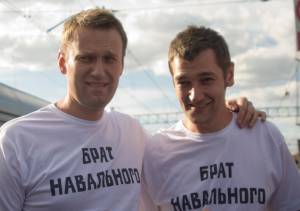Kremlin hostage Oleg Navalny punished for New Times article
 The brothers (Oleg is on the right) - their T-shirts read: "Navalny's brother"
The brothers (Oleg is on the right) - their T-shirts read: "Navalny's brother"
Oleg Navalny, brother of the prominent Kremlin critic and politician Alexei Navalny, has been put in a punishment cell for 15 days and is to be transferred to maximum security conditions after writing a first blog article for the Russian journal Novoye Vremya [New Times].
Alexei Navalny reports that his brother’s lawyer has still not been able to see the documents formalizing both the punishment cell and the maximum security transfer. Delay in providing them, he says, is for one obvious reason – to obstruct their appeal.
Mediazona had earlier reported the 15-day punishment which was supposedly for “persistent infringement – holding and using prohibited items”, though the penitentiary service representative declined to specify which particular “prohibited items”.
The anonymous “items’ were found shortly after his blog entitled “Potemkin Prison” was published. In it, he explains that the authorities have learned their lesson after the bad press they got for the conditions imposed on the two Pussy Riot members imprisoned, and are following all the rules with him.
He notes that if you look at the documents used to imprison around 90% of the prisoners, then you should either release them or reduce their sentences. Worryingly, he reports that the prisoners don’t like the government and Putin (he explains that they hate the police, and FSB [security service] people even more), yet they support Russia’s position on Ukraine and Crimea. Here, however, he mentions the influence of Pyervy Kanal and NTV [both heavily pro-Kremlin and full of propaganda] as their main source of information.
The three-year sentence passed on Oleg Navalny at the end of December 2014 was widely seen as hostage-taking and an attempt to stifle his brother, a leading political opposition figure.
On Jan 22 the authoritative Memorial Human Rights Centre published a statement regarding the sentences passed by a Moscow court on both Navalny brothers. Memorial had previously condemned their trial as politically motivated, and is now clear that Oleg Navalny must be considered a political prisoner.
It based its position on the fact that “an obvious political motive can be seen for the prosecution, namely to stop the public activities of Alexei and remove the risks that his activity presents the current regime.” Additionally, however, Memorial believes that there was nothing criminal in the Navalny brothers’ actions, and that any disputes that arose over ordinary economic activities should have been resolved through civil action. “However the individuals declared ‘victims’ did not present any grievances, and the criminal prosecution was effectively initiated not through their initiative, but at the initiative of the Russian Federation’s Investigative Committee.”
Memorial points out that it first declared Alexei Navalny a political prisoner after he was placed under house arrest and the trial in the Zamoskvoretsky District Court only confirmed its position, by demonstrating the Navalny brothers’ innocence.
Oleg Navalny was given an actual three year sentence and taken into custody. Memorial believes that this is further cause for considering him a political prisoner and his imprisonment unlawful. Other grounds were the circumstances around the passing of sentence. As reported, the original date for the court hearing was Jan 15, 2015, and major demonstrations in support of the brothers were planned for that day. Even under Russia’s draconian laws on peaceful assembly it was difficult for the authorities to totally ban demonstrations announced far in advance and in full accord with Russian legislation.
They resorted to other measures, and on Dec 29 it was suddenly announced that the court hearing had been brought forward to the next morning. This meant that any protest, aside from single-person pickets, would be illegal. A very large number of protesters were detained, with many held overnight in detention.
Memorial points out that the court only read out the sentence part of the ruling, not the justification part. It is strictly prohibited in Russian law to remand in custody a person only charged with economic crimes. Since the full verdict had not even been provided, and the sentence had not come into force, the fact that Oleg Navalny was immediately taken into custody still further confirms the political nature of this case.
The case was overtly political and it is greatly to be regretted that Yves Rocher should have cooperated with the Russian authorities over it.
Halya Coynash





